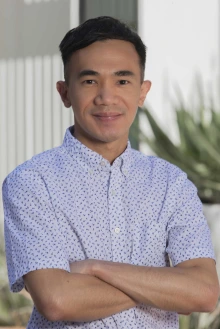Pharmacy’s Kenry receives junior faculty enhancement award
Kenry, PhD, an assistant professor at the University of Arizona R. Ken Coit College of Pharmacy, received the Ralph E. Powe Junior Faculty Enhancement Award from Oak Ridge Associated Universities.

Kenry, PhD
Photo by Noelle Haro-Gomez, UArizona Health Sciences Office of Communications
“I am truly honored and humbled to be selected as a recipient of this year’s award,” said Kenry, who goes by one name. “For a new principal investigator like me, receiving this award is extremely encouraging, as it shows the importance of the work my team is doing. It also reaffirms my group’s commitment to leveraging our technical skills and expertise to address some of the unmet needs in ovarian cancer diagnosis to ultimately improve patient outcomes.”
Kenry joined the Department of Pharmacology and Toxicology in June 2023 after completing his postdoctoral work at Harvard University.
According to its website, ORAU provides innovative scientific and technical solutions for the U.S. Department of Energy and other federal agencies to advance national priorities in science, health and education. The organization does this through its specialized teams of experts and a consortium of more than 150 major colleges and universities. The Ralph E. Powe Junior Faculty Enhancement Awards program provides funds to enrich the research and professional growth of young faculty.
“We have a strong track record of providing a supportive environment to accelerate the professional growth of our junior faculty members,” said Xinxin Ding, PhD, a professor and head of the Department of Pharmacology and Toxicology. “Kenry is the newest addition to our team, and, as a department head, I am tremendously proud of his team’s accomplishments. His track record in cutting-edge cancer research, innovative projects, motivation to improve ovarian cancer diagnosis and strong institutional support made him an exceptional recipient of the ORAU Ralph E. Powe Junior Faculty Enhancement Award.”
The Kenry lab seeks to improve patient outcomes and health by enabling more targeted, earlier and safer detection and treatment of cancer. To this end, the team adopts an integrative approach, which combines micro- and nanoengineering with machine learning, to design and build more advanced diagnostic and therapeutic tools and modalities.
“As a translational cancer nanomedicine scientist, I am eager to improve diagnostic technologies to facilitate earlier cancer detection and more timely intervention, particularly for underserved populations,” said Kenry. “Generally, women with ovarian cancer seldom develop any noticeable symptoms until the disease has progressed to a later stage. Unfortunately, current ovarian cancer screening methods still lack the necessary selectivity and sensitivity to detect this cancer at an early stage, and we hope we can further improve this situation with the support of the Powe Award.”

